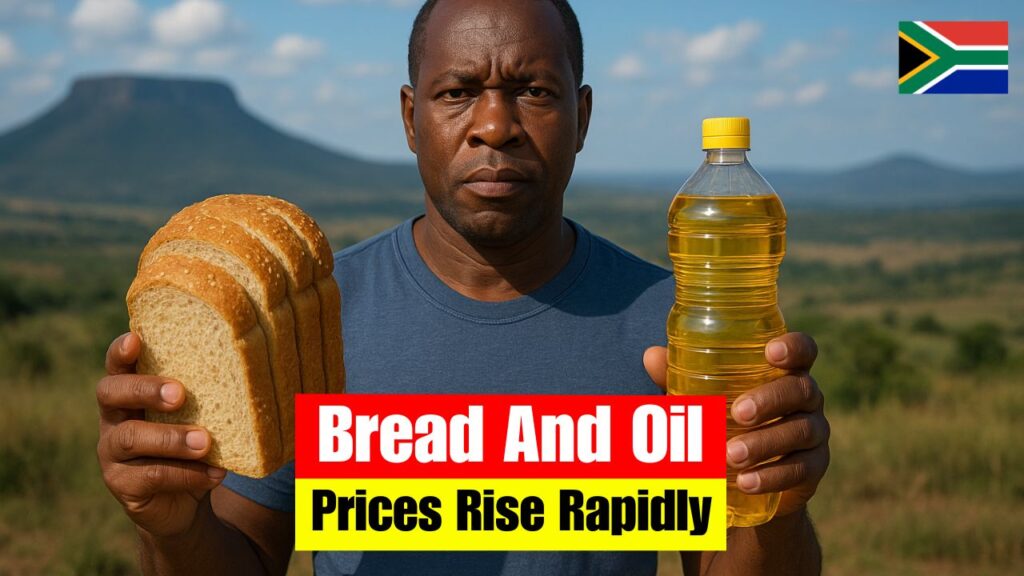As South Africa moves into August families across the country are getting ready for a major increase in food costs. The price jump affects basic items like bread and cooking oil more than anything else. Several reasons explain why these costs are going up. Global supply chains are not working smoothly and production expenses have climbed higher. Weather conditions have also been unpredictable and this has hurt how much farmers can grow. These basic foods are central to what most South African families eat every day. The price increases will affect people from all income levels. This situation shows why families need to plan their spending carefully & manage their resources better in the coming months.

Why Bread and Cooking Oil Prices Are Climbing Rapidly Across South Africa
The recent increase in bread and oil prices has worried both economists and everyday shoppers. Bread is a basic food item in many South African homes & its cost has gone up because wheat prices have risen worldwide. Cooking oil has also become more expensive due to higher costs for imported products and less oil being made locally. These price increases matter beyond simple statistics because they change how millions of people live each day. Families now face difficult decisions and often have to buy less nutritious food to stay within their budgets. This problem shows why it is important to understand how markets work and to look for other options that might reduce the financial pressure on households.
– Global wheat shortages
– Increased transportation costs
– Energy price hikes
– Local production challenges
– Import tariffs and taxes
| Factor | Impact Level | Updated Reason | Improved Solution |
|---|---|---|---|
| Global Wheat Prices | High | International supply shortages and unstable export markets | Expand domestic wheat output and reduce dependency on imports |
| Transportation Costs | High | Continuous rise in fuel charges and logistics inefficiencies | Introduce targeted fuel relief and upgrade transport systems |
| Energy Prices | Moderate | Increasing utility bills for mills and food producers | Promote energy-saving practices and renewable alternatives |
| Local Production | Low | Weak crop yields due to outdated farming methods | Adopt modern agricultural technology and irrigation systems |
| Import Tariffs | Moderate | Higher import duties impacting raw material prices | Implement tariff reforms to ease cost pressures |
How the Price Spike Is Affecting Daily Budgets and Vulnerable Households
The increasing prices of bread and oil hit South African households hard. Low-income families feel the pressure most. When these basic items cost more, family budgets get tighter. This forces people to cut back on important things like medical care and schooling. The impact spreads wider as more families need help from community groups and food banks. Communities must unite during tough times like these. By sharing what they have and helping each other people can better handle these money problems. Families spend less on things they don’t absolutely need. More people borrow money or use credit to get by. The number of people asking for government help goes up.
Local Community and NGO Efforts Responding to the December Cost Surge
| Initiative | Description | Beneficiaries | Outcome |
|---|---|---|---|
| Food Assistance Centres | Distributes essential groceries and staple food items at no cost | Low-income households | Helps reduce food insecurity |
| Urban Community Farms | Encourages local crop production through shared gardening spaces | Local residents and neighbourhood groups | Strengthens community food resilience |
| Money Management Workshops | Improves budgeting, saving and everyday financial decision-making skills | Individuals and families | Boosts long-term financial stability |
| Low-Cost Meal Scheme | Provides nutritious meals at reduced prices to support daily dietary needs | School-going children | Enhances overall health and classroom performance |
Practical Ways Families Can Manage and Reduce Essential Living Expenses
Managing Rising Food Costs in South Africa South African families facing higher food prices can use practical methods to reduce their spending. A good starting point is to change meal planning by using more local and seasonal fruits and vegetables that typically cost less and taste better. Shopping in bulk and watching for special offers can also lead to substantial savings over time. Many households find value in learning basic money management skills through community programs that teach better budgeting techniques. These approaches help families deal with current economic challenges while building stronger financial habits for the future. Key Actions to Consider Choose fruits and vegetables that are in season Purchase larger quantities when stores have discounts Join workshops or classes about managing household finances Grow some of your own food at home
| Food Source | Key Benefit | Estimated Cost | Overall Availability |
|---|---|---|---|
| Local Farmers’ Markets | Fresh, seasonal and chemical-free produce | Medium | Widely Available |
| Community Supported Agriculture (CSA) | Weekly farm-harvest boxes directly to consumers | Varies by plan | Moderate Access |
| Home-Grown Vegetables | Highly cost-effective and fully organic | Very Low | Easy to Grow |
| Bulk Buying Clubs | Wholesale pricing with large quantity savings | Low | Moderate Availability |
What the Government Is Doing to Stabilise Prices and Protect Consumers
The South African government understands the problems created by increasing food prices & is working to solve them through new policies. Current programs focus on strengthening local food production and reducing reliance on imported goods. This involves putting money into farming technology and infrastructure to improve output. The government is also discussing changes to import taxes that make food more expensive for consumers. These actions will take time but represent important progress toward creating a stable market & guaranteeing food security for everyone in South Africa. Investing in agricultural innovation Reviewing import policies Supporting small-scale farmers Enhancing supply chain efficiency
| Policy | Impact Area | Expected Outcome |
|---|---|---|
| Agricultural Investments | Production Capacity | Increased output |
| Tariff Reductions | Import Costs | Lower consumer prices |
| Farmer Support Programs | Rural Economy | Economic growth |
Long-Term Economic Risks and What Rising Food Costs Mean for 2025
The current rise in bread and oil prices needs attention right now but South Africa must also think about what this means for the economy in the years ahead. When food prices stay high for a long time they create inflation that makes money worth less and can slow down economic progress. The private sector needs to work together with government to build a food system that can handle problems from both global markets and local issues. This means supporting new ideas & better farming methods while promoting practices that protect the environment throughout the food industry.




